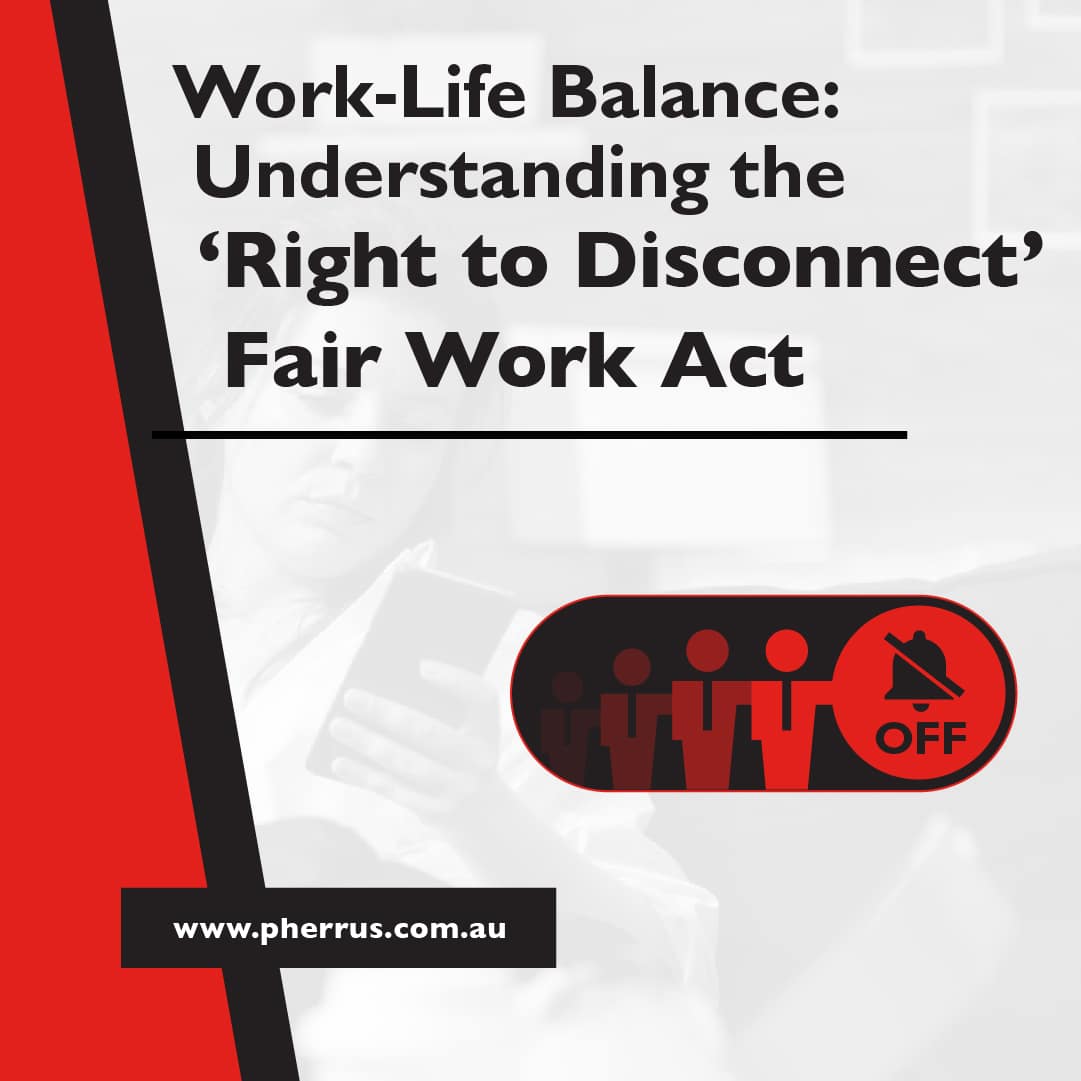As an employee, you no doubt look forward to heading home and switching off at the end of a work day.
But if work creeps into your personal time, with your employer contacting you after-hours, it can lead to stress and burnout.
For employers, this effect on your employees can lower their job satisfaction and decrease their productivity, ultimately impacting the success of your business.
As of August 26, 2024, Australian employees have the right to say no to after-hours emails and calls.
Let’s find out how this new ‘Right to Disconnect’ Fair Work Act will affect you as an employee or employer.
What Is the ‘Right to Disconnect’ Act?
Under the ‘Right to Disconnect’ Fair Work Act, employees now have the legal right to decline work-related contact outside their regular hours unless their refusal is deemed unreasonable.
This change marks a significant step toward reclaiming work-life balance in an era of blurred boundaries between home and office, particularly as hybrid and remote work models have become the norm.
Key Provisions of the ‘Right to Disconnect’ Law
For Employees
-
- Employees can decline to respond to work-related communications outside their ordinary work hours without facing disciplinary action unless their refusal is unreasonable.
- Refusal is determined as unreasonable depending on
- The reason and nature of the contact.
- The disruption caused.
- Compensation for the additional work.
- The employee’s role.
- The employee’s personal responsibilities.
- Exceptions to the right to disconnect:
-
- Employees such as emergency service personnel, health care workers, and IT or infrastructure support staff managing critical systems must respond to work-related communications if required by law.
- Employees on-call or receiving an allowance for being available outside regular hours are still expected to respond to specific work-related matters.
For Employers
- Employers must respect the boundaries of out-of-hours communication unless the communication is reasonable under the new legislation.
- Employers can bring disputes over the right to disconnect to the Fair Work Commission.
- Certain roles that require on-call duties or emergency contact are exempt from the law as long as reasonable compensation is provided.
Who Is Covered?
The ‘Right to Disconnect’ Fair Work Act currently applies to employees of non-small businesses (15+ employees) and will extend to employees of small businesses on August 26, 2025.
Modern employee awards were updated in August 2024 to include this law, but specific terms about things like emergency roster changes and on-call duties may vary depending on the industry or role.
For employees covered by an enterprise agreement, there may be terms in their agreement that modify or add extra conditions beyond the general ‘Right to Disconnect’ law.
So, carefully reviewing the agreement is important to understand how the policy applies in your workplace.
Impact on the Workplace
Benefits
One major benefit of the ‘Right to Disconnect’ law is improved work-life balance.
Allowing employees to fully disconnect after ordinary work hours helps reduce stress and burnout by giving them the time they need to recharge.
As a result of not being contacted once they clock off, employees can manage their personal responsibilities more easily, making them more focused and productive during working hours.
Additionally, when employees feel their personal time is respected, job satisfaction increases, leading to higher retention rates.
This mutual respect also strengthens relationships between employers and employees, fostering trust and contributing to a healthier workplace culture.
Potential Challenges
The inability to reach employees after hours may cause delays in critical work tasks or decisions, so employers will need to establish clear, compensated on-call systems to manage this.
Some employers may struggle to adjust their communication practices and expectations to align with the new regulations, and there could be confusion about how to implement the law, especially when defining what constitutes ‘reasonable’ out-of-hours contact.
For detailed guidelines and information about the ‘Right to Disconnect’ legislation, employers can visit the Fair Work Ombudsman website or consult the Fair Work Commission.
Tips for Employees and Employers
Adjusting to new policies can be tricky, so here are some helpful tips.
For employees:
- Understand your out-of-hours and workplace rights.
- Discuss expectations with your employer.
- Utilise tools and techniques to help you disconnect once your ordinary work hours are over (e.g., setting ‘out of office’ messages).
For employers:
- Review the new out-of-hours communication policies to ensure you understand your level of responsibility towards your employees.
- Provide training to your team on the new law and its implications.
- Foster open communication with your employees about your expectations and theirs.
FAQs
‘Right to Disconnect’ Australia Effective Date
The ‘Right to Disconnect’ Fair Work Act came into effect for employees of non-small businesses (15+ employees) in Australia on August 26, 2024.
The policy will extend to employees of small businesses on August 26, 2025.
‘Right to Disconnect’ Eligible Employees
The right to decline work-related contact outside ordinary work hours applies to most standard Australian employees.
Employees in roles with compensated on-call responsibilities, such as emergency services personnel, IT support staff, and maintenance technicians, typically have the right to disconnect outside of their scheduled on-call shifts.
The End of the ‘Always On’ Culture
The ‘Right to Disconnect’ Fair Work Act is about more than just legal obligations; it’s a change designed to end the ‘always on’ work culture.
Employees can switch off after working hours, and employers can promote healthier work environments.
As an employer, navigating the new ‘Right to Disconnect’ legislation can impact payroll, tax deductions, and overall business expenses.
At Pherrus, we can help your business comply with employment and taxation laws while optimising your financial strategies.
Get in touch today by filling out our online form or calling (02) 9099 9109 to book an appointment at our Bella Vista office in Sydney, NSW.





